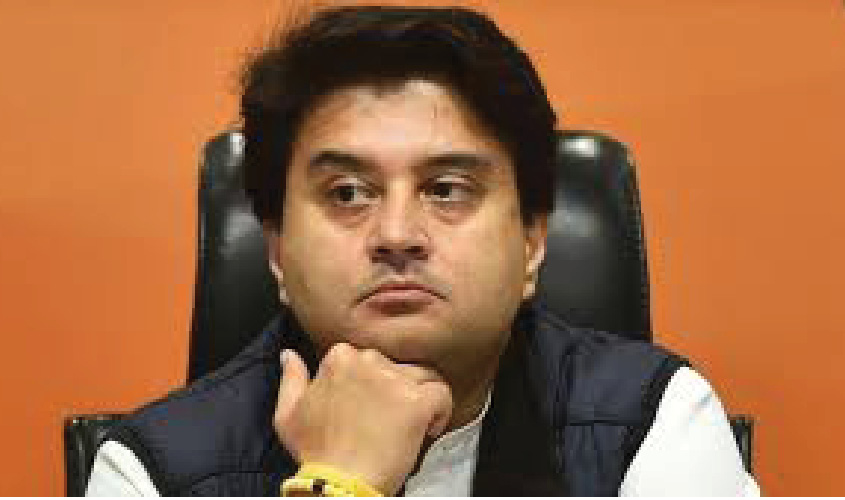Jyotiraditya Scindia’s well-calibrated move to join the Bharatiya Janata Party and sever links with the Congress may well turn out to be a case of political hara-kiri. The 49-year-old politician, from the erstwhile Gwalior royal family, was regarded as a leader with a promising future, and many of his contemporaries thought rather highly of him, considering him potential future Prime Minister material. However, his political fortunes may now undergo a drastic change, and though he may be accorded a plum position by his new political bosses, his credibility amongst those with whom he had, over the years, shared the same political space, stands eroded.
Significantly, Jyotiraditya tendered his resignation from the Congress on the birth anniversary of his late father, Madhavrao Scindia, who had joined the grand old party in 1980 after irreconcilable differences with his mother, Vijay Raje Scindia. The rift in the Gwalior family led to one section remaining with the saffron brigade and the other with the Congress.
In fact, in 1980, Vijay Raje Scindia was pitted as the Opposition candidate against Indira Gandhi from Rae Bareli. The latter was also contesting from Medak, since she had lost the 1977 polls from her traditional seat in Uttar Pradesh to socialist icon Raj Narain. The India Today cover of that particular showdown had both women facing each other, with the caption crying Mrs India versus Mrs Scindia. The result was a foregone conclusion, with Indira triumphing in an emphatically conclusive manner. It is a different matter that she decided to resign from the seat in order to represent Medak.
Vijay Raje went on to co-found the BJP, along with Atal Behiri Vajpayee, L.K. Advani and Murli Manohar Joshi, and till her death remained a key figure in the organisation. Madhavrao, on the other hand, won the trust of the Congress leadership and in 1984 contesting on the Hand symbol from Gwalior, trounced Vajpayee in a mega-fight. Indira Gandhi had serious reservations regarding him and according to the late Makhan Lal Fotedar, had advised Rajiv Gandhi, in Arun Nehru’s presence, to maintain a distance from him. Indira is reported to have told Rajiv that he should not induct Madhavrao in his Cabinet while also cautioning him not to bring
Madhavrao had known Rajiv and Sonia since the late 1960s, when they were in England; due to this association he began emerging as a Congress leader of both substance and clout. He consolidated his position post-Rajiv’s assassination, briefly leaving the Congress after P.V. Narasimha Rao sought to implicate some of the North Indian leaders in the infamous “Jain Hawala Diary” case. He formed a regional party, subsequently returning to the Congress fold after Rao ceased to be the president.
Using his earlier proximity to Sonia Gandhi, Madhavrao acquired Prime Ministerial ambitions, firmly believing that he would be the automatic choice for the coveted position when in 1999 the Vajpayee government was ousted by a single vote. Peeved that Sonia had opted to support Dr Manmohan Singh, as was communicated to the then President, K.R. Narayanan, he ensured, through close friend Amar Singh, that Mulayam Singh Yadav withdrew his support to the Congress-led alliance.
He would have remained a pivotal player had he not on 30 September 2001, died under mysterious circumstances in a plane crash. Thus Jyotiraditya was brought into the scene, he becoming the natural successor to his father, thereby rising rapidly in the Congress. He benefited both from his association with Sonia, who groomed him like a son, as well as through the legacy of his father, who as is known, was an extremely influential and well-connected leader.
In the Congress, Jyotiraditya, through sheer determination and articulation, jumped many queues, making many regarding him as the future leader of the party. This opinion was not misplaced since the high command gave him all the possible opportunities to thrive. Prior to the 2019 Parliamentary polls, he was provided a status at par with Priyanaka Gandhi Vadra, and made in-charge of Western UP while she looked after Eastern UP. Unfortunately for him, he lost from his seat in the Gwalior region, and the Congress too, continued to have a dismal run, securing only 52 seats in Parliament.
His frustration was in full view when he was unable to have his way in Madhya Pradesh where the duo of Kamal Nath and Digvijaya Singh continued to outmanoeuvre him. Advised by people close to him, he took the plunge and shifted to the saffron brigade, much to the discomfort of many BJP leaders who feel threatened by his entry.
He has been granted a Rajya Sabha nomination since top BJP functionaries believe that it would lead to the fall of the Congress government. Whether this happens or not would be known in the near future, but he definitely would have to carve out a space for himself in his new party. In the Congress, Sonia and Rahul had ensured that he was well looked after, but the same may not necessarily be the case in the BJP. Behind the façade of felicitation, conspiracies might already be brewing; unlike the Congress, where he evolved under the attentive eyes of Sonia Gandhi, he may have to deal with equally ambitious leaders within the BJP. The immediate gain is on the wide screen. It is the long run that would ultimately matter. Between us.

